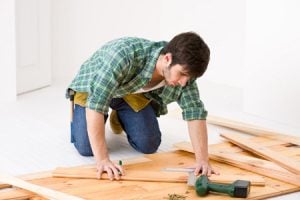Injury Prevention Tips For DIYers
When you finally get round to that home improvement or DIY project you’ve been planning for a while, you’ll be eager to get the job done quickly. Injuries, even small ones, can delay your project so it’s important to take steps to prevent injury.

The next time you start work on a home improvement or DIY project, consider these safety measures to help keep you injury-free and your work finished on time:
* Limber up

DIY often requires you to use muscles that you may not exercise often. Give your entire body a good stretch, from your head to your feet, including your hands, since you’ll be using them frequently. You might not realise how much your body works while you DIY, but the next time you are drilling into walls, cutting wood with a jigsaw or carting tools and materials, take note of the muscles involved and you will soon realise that DIY is good for body and mind.
* Dress sense

Wearing the right clothing for your project helps to protect you from scrapes, contact with harmful chemicals and other injuries. Closed-toed shoes, work gloves, a hat or head scarf are all a good start. Also, remove any jewelry and tie long hair back to avoid getting something caught in machinery. While we know that ladies like to look good all the time, save the makeup for after the project. Makeup and sawdust just don’t mix.
* Reduce muscle strain

Drilling into walls, sanding wood, painting large walls – your wrists will be subject to a lot of strain, which can easily result in pain after a long day of work. Using modern, lightweight power tools reduces the amount of strain on your hands and wrists. When buying power tools, choose a size that sits comfortably in your hands to reduce fatigue and strain.
* Protect yourself

Safety glasses or goggles and ear plugs are two tools you, and anyone around your work area, should be wearing while you’re working on your project.
Safety goggles come in handy when metal filings or ceramic tile shards are flying through the air, especially when using an angle grinder or cut-off saw. Ear plugs or ear muffs are recommended when using any type of noisy machinery, such as an angle grinder or hammer drill.
* Take breaks
Make certain that your schedule includes breaks where you can sit down, grab a drink and rest for 10 minutes. If you’re working on a project in hot weather, schedule breaks more frequently and drink plenty of water.
Use the time to also stretch your muscles, keeping them as limber as possible while you continue to work. Don’t overexert yourself attempting to get the project done in a shorter amount of time and stop if you are tired. Your body will work better and longer at a slower pace, and when the project is completed, you’ll be able to enjoy the results of your work in comfort. Protect yourself while working on your DIY home improvement project, so that you’ll be able to accomplish the project in the time you scheduled, without any injuries to slow you down.


Comments
Add comment